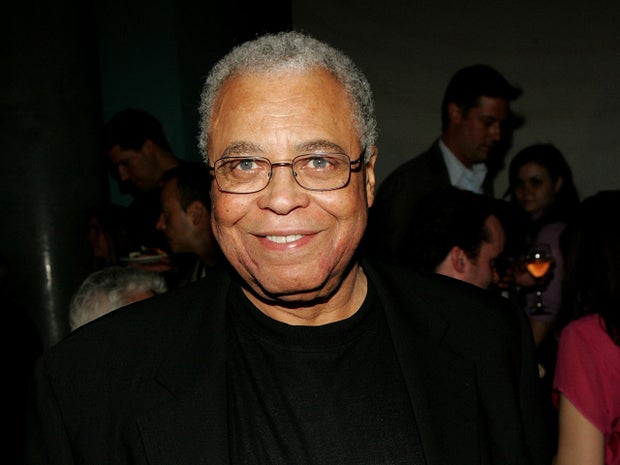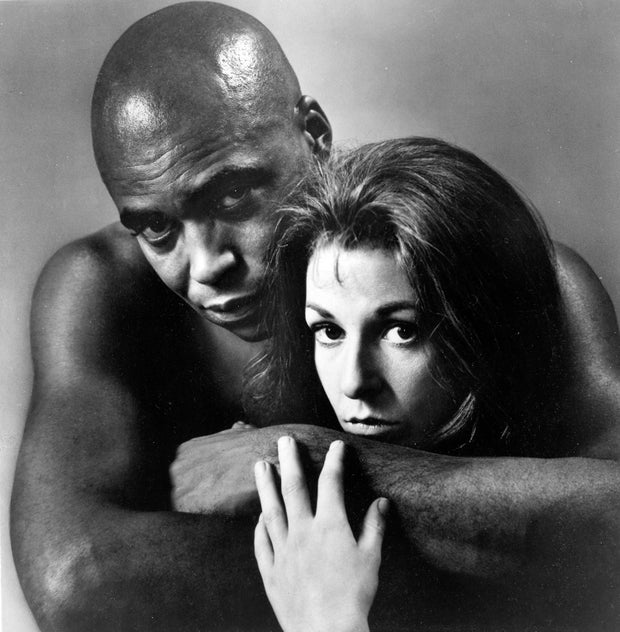[ad_1]
Stage and screen actor James Earl Jones, who won Tony Awards for “The Great White Hope” and “Fences,” and whose majestic basso profundo voice would become internationally recognized as the villainous Darth Vader in the “Star Wars” franchise, has died, his rep confirmed to CBS News. He was 93.
An actor renowned for his theatrical presence in works by Shakespeare, Eugene O’Neill, Tennessee Williams, Jean Genet, Anton Chekhov, August Wilson, Athol Fugard and Alfred Uhry, and in such acclaimed films as “Field of Dreams,” Jones would become even more famous for his voice, whether it was as a commercial pitchman, an announcer for CNN, the father of Disney’s animated “Lion King,” or a Dark Lord of the Sith — all the more remarkable given that as a child he suffered a stutter, which continued throughout his life.
“I stuttered so badly it was embarrassing and very painful,” Jones told CBS’ “Sunday Morning” in 2008.
Jones’ road to overcoming his stutter would lead to a monumental career on Broadway and in Hollywood, with nearly 200 film and TV credits. He broke ground on soap operas (appearing on CBS’ “As the World Turns” and “Guiding Light”); worked with such directors as Stanley Kubrick, Franco Zeffirelli, George Lucas, John Sayles and James Ivory; won a Grammy for a spoken word recording; and lent his voice to recordings of works as varied as Lewis Carroll, “Sesame Street,” the King James Bible and “The Simpsons.”
In 2008, when he returned to Broadway to play Big Daddy in a revival of “Cat on a Hot Tin Roof,” Jones was asked if the stage was an oasis for him. “Oh, I wouldn’t say that; an oasis is a place for survival,” he remarked. “And this is about joy. … It’s a playpen.”
Paul Hawthorne/Getty Images
Breakout roles
Jones was born on January 17, 1931, in Arkabutla, Mississippi. His parents separated before his birth, and he was left to be raised by his maternal grandparents, who moved the family from their Mississippi farm to the Midwest. Growing up in the backwoods of Michigan, Jones credited an English teacher who helped him overcome his stutter, which had caused him to speak hardly a word from the time he was 6 until he was 14.
“Professor Crouch was my English teacher. And when he discovered that I secretly wrote poetry he challenged me,” Jones told “Sunday Morning.” “He said, ‘Jim, if you like words that much, you know, you should be able to say them out loud. Why don’t you get up in front of the class and read that poem that you wrote? … The only way you can prove you wrote it is to say it out loud but from memory.'”
Regaining the power of speech through poetry inspired Jones to pursue a career in the arts. After starting out pre-med at the University of Michigan, he switched to drama in his junior year. An ROTC member, Jones served in the Army as a second lieutenant beginning in 1953, training at Fort Benning in Georgia, and was assigned to Camp Hale near Leadville, Colorado. He was discharged as a first lieutenant.
In New York, Jones studied at the American Theatre Wing, cleaning toilets while he auditioned for parts. He landed his first Broadway role in 1957, appeared in experimental plays off-Broadway, starred in numerous Shakespeare productions (including “Othello,” “Coriolanus,” “The Merchant of Venice,” “Troilus and Cressida,” “Hamlet” and “King Lear”), was featured in the films “Dr. Strangelove” and “The Comedians,” and on TV’s “Guiding Light” and “As the World Turns.”
In 1967 the Arena Stage, in Washington, D.C., reached out to Jones – then working in Europe – to star in Howard Sackler’s “The Great White Hope,” a drama inspired by the life of a Black boxer, Jack Johnson, who contended against the heavyweight champion, a White man. “Howard suggested that I start getting into shape, which was really important – the man was a boxer – but which I was not and am not and will never be!” Jones said to Smithsonian Magazine. “In fact, the young man who was my understudy onstage, Yaphet Kotto, resembled Jack much more than I did.”
Afro Newspaper/Gado/Getty Images
In 1969 Jones won a Tony Award for “The Great White Hope” after the show transferred to Broadway. He earned an Oscar nomination for the 1970 film version.
His film work thinned in the ’70s, despite notable appearances in “Claudine,” “The Man” (as the first Black president), “The Bingo Long Traveling All-Stars & Motor Kings,” “A Piece of the Action,” “The Greatest” (playing Malcolm X), and the TV movies “The Cay,” “The UFO Incident” and “Jesus of Nazareth.” He appeared on stage as Paul Robeson, Lennie in “Of Mice and Men,” and Hickman in “The Iceman Cometh.”
But it was a voiceover job for a science-fiction film that would launch his career into the stratosphere. Providing the ominous voice of Darth Vader, Jones recorded his dialogue for George Lucas’ “Star Wars” in about two-and-a-half hours. Salary: Around $7,000. “I was broke and for me that was good money,” he said. “I got lucky.”
Screen Archives/Getty Images
It was easier than other voiceover jobs because no lip-syncing was involved – Darth Vader had no lips! – so Jones simply responded to the body language of David Prowse, the British actor-bodybuilder who acted the role of Vader behind the devilish mask. A breathing effect created by sound effects artist Ben Burtt, who placed a microphone inside a scuba regulator, was added to Jones’ voice, making Vader sound less than human.
Jones requested his name not appear in the credits, out of deference to Prowse. [Jones would not be credited as the voice of Vader until the release of “Return of the Jedi.”] But when he came to record the role for “The Empire Strikes Back,” Jones asked Lucas about deepening the character: “Naturally, I wanted to make Darth Vader more interesting, more subtle, more psychologically oriented,” he told the American Film Institute. “And [Lucas] said, ‘No. no. What we’re finding out is you’ve got to keep his voice on a very narrow band of inflection because he ain’t human, really.'”
But Vader was a dad. And when Jones came to record the game-changing line about Luke Skywalker’s parentage (“I am your father”), Jones was sure he was lying, and that the real truth would come out in the subsequent film.
Beyond the “Star Wars” universe, Jones’ film and TV credits included “Roots: The Next Generation,” “Conan the Barbarian,” “Gardens of Stone,” “Coming to America,” “Matewan,” “Field of Dreams,” “The Hunt for Red October,” “Gabriel’s Fire,” “Patriot Games,” “Sneakers,” “Sommersby,” “Clear and Present Danger,” and “Cry, the Beloved Country,” in addition to numerous narration credits. He also voiced Mufasa, the father of Simba, in Disney’s “The Lion King,” and, of course, the character of Vader in all its prequel, sequel, TV and video game iterations.
It was for Jones a happy accident that the stutterer should become best known for his voice. “That’s the best irony – I am an irony,” he told “The Early Show” in 2002. “Therefore, I can’t take any credit or any pride. Pats on the shoulder don’t count. I’m just happy to be able to talk, but the irony is just wonderful and I can smile and say, ‘Oh, the Voice. The Voice of the Century, the Voice of God, the Voice of blah-blah-blah.’ It’s just irony!”
His later Broadway roles included “Othello,” “Master Harold … and the Boys,” “Fences,” “On Golden Pond,” “Cat on a Hot Tin Roof,” “Driving Miss Daisy,” “You Can’t Take It With You,” and “The Gin Game.”
Jones won two Emmy Awards (for “Heat Wave” and “Gabriel’s Fire”), and a Daytime Emmy for the children’s special “Summer’s End.” He was a Kennedy Center honoree in 2002, received a lifetime achievement Screen Actors Guild Award in 2009, and was awarded an honorary Oscar in 2012 (which granted him EGOT status). In 2017 he received a special Tony for lifetime achievement.
In 2022 a Broadway theater, the Cort, was renamed the James Earl Jones Theatre in his honor. It was the same house where he performed in “Sunrise at Campobello” in 1958. On the occasion of the renaming, Jones told “CBS Mornings” that he took great pride in the longevity of his career: “By taking one step at a time, I’ve found great treasures,” he said. “Every step I take.”
[ad_2]
Source link





